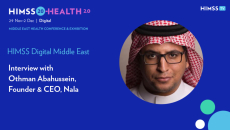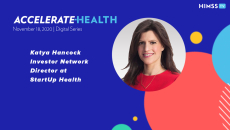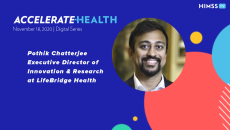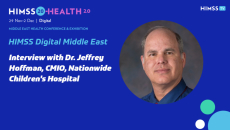COVID-19
Othman Abahussein, CEO of Nala, discusses how government initiatives are helping to meet user demands and drive digital health in the Kingdom of Saudi Arabia, reflected in the rise of telemedicine and e-prescriptions.
Katya Hancock, Investor Network director at StartUp Health, says although Q3 2020 was the largest quarter for digital health funding in history, there's still a lot of work to do to address the most pressing healthcare needs.
Dr. Osama Elhassan, coordinator of the ZIMAM initiative, says digital skills should be prioritized by the workforce to help improve workflows and care pathways.
Pothik Chatterjee, executive director of innovation and research at LifeBridge Health, says his team responded to the COVID-19 crisis with mobile clinics, digital patient monitoring and on-site PPE production.
This week's top stories include the Supreme Court appearing favorable to keeping the Affordable Care Act, Google Cloud unveiling AI tools for analyzing unstructured medical text, and Epic customers gaining access to a COVID-19 risk prediction model.
AccessOne CEO Mark Spinner says as health systems face revenue cycle challenges due to COVID-19, one key to maintaining margins is delivering "patient-friendly" payment options.
Dr. Fadi Al-Buhairan, deputy CEO and general supervisor for strategic and operational affairs for Saudi Post, discusses how digital systems and communities have collaborated during the COVID-19 pandemic.
Dame Sally Davies, former CMO for England and current Master of Trinity College in Cambridge, UK, says governments must effectively leverage behavioral, economic and movement data to improve outcomes during future pandemics.
H.E. Dr. Abdullatif Mohammed AlShamsi, president & CEO of Higher Colleges of Technology in the UAE, says HCT was able to make a smooth transition to a hybrid model of training by teaching online while maintaining a clinical practice.
Dr. Jeffrey M. Hoffman, chief medical information officer at Nationwide Children's Hospital, says the explosion of telehealth, videoconferencing and digital tools generally has been essential during COVID-19.









